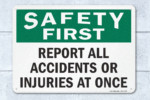
An efficient and effective return-to-work (RTW) program can significantly reduce workers’ compensation costs for employers while improving the lives of employees by getting them back on the job following a work-related absence due to injury, illness or chronic disease.

Decades ago, it was not uncommon for a business to pay directly – rather than report – their company’s small claims. The thought was to avoid having those claims count against the experience modification factor (the “mod”). For Workers’ Comp insurance, medical-only claims are an important element in the experience modification rating process, and in many states these claims are reduced by 70% for the mod calculation. This reduction is known as the experience rating adjustment (ERA).

While inflation has always been a concern within the commercial insurance market, over the past year inflationary pressures have influenced various sector trends – including labor shifts, employee wages, medical expenses and rate adequacy challenges.

According to a recent study by the National Safety Council, the average workplace injury results in 21 days of disability. This means that some workers are able to return to work fairly quickly (if they even miss any time at all), while others experience long-term disabling effects from their job-related injuries.

When it comes to workplace safety, there are few roles more influential than that of the supervisor. While handling the everyday situations that help ensure a company’s efficiency and success, supervisors are an integral part of workplace safety programs. Such programs utilize risk management techniques to keep employees safe on the job, thus reducing workers’ compensation costs.

When a worker is injured, there are specific timelines to follow and forms to complete with respect to workers’ compensation insurance. But what about when a worker is injured and refuses to accept treatment or file a claim? What are your responsibilities as the employer? While the exact legal answer depends on your situation and state laws, consider the following to limit your liability.

The key to controlling your workers’ compensation costs is understanding your experience modification factor. Your “mod factor” is an adjustment to your workers’ compensation premium that’s based on your company’s actual losses compared to the expected losses for your industry.

Navigating a workers’ compensation claim can be a complicated and costly process if it’s not resolved in a timely manner. However, there are a number of measures that you can take to reduce the complexity and cost of a claim. The following content presents an overview of when employers should report workers’ compensation claims and how this process can help prevent unnecessary costs.

When a workplace injury occurs, a number of events are put in place that will ultimately lead to recovery – whether it takes days, weeks or months. But no matter how prolonged the recovery period, the first 24 hours after an injury are the most crucial.

As the popularity of electric vehicles continues to soar, so does the need for electric vehicle charging stations. In fact, this amazing growth has prompted many companies to consider installing vehicle charging stations, also known as electric vehicle supply equipment (EVSE) stations. EVSE stations can be a large asset to your business; they can increase employee retention, improve your image and help you meet sustainability goals. However, the costs and risks of adopting a new and evolving technology can be even more significant if you don’t take all of your unique considerations into account.

There are a number of factors that impact the pricing of your workers’ compensation premiums. Among the most important are the classification codes for each type of work done at your business. Each of these codes has an associated loss cost that represents the expected amount insurers will need to pay for a claim. And even though each of these costs are standardized by the National Council on Compensation Insurance or state governments, your actual premiums may be higher because of a concept called loss cost multipliers.

While the COVID-19 crisis has seemingly upended the entire world, the light at the end of the tunnel is becoming brighter with each passing day. This is great news for businesses across the country. Yet, in the wake of the pandemic, organizations will need to adapt to a number of fundamental workplace changes.

The value of a comprehensive safety culture cannot be overstated when it comes to reducing workplace illnesses and injuries, and their associated costs. But creating such a culture is not an overnight process or “flavor of the month” program. Instead, it is a multi-year, top-management commitment that results in an organization with low accident rates, low turnover, low absenteeism and high productivity. This is a big-picture, long-term project.

Any person who has been involved in a motor vehicle collision will tell you it can be a stressful experience. Whether or not you are at fault, it can be easy to feel overwhelmed and confused. If you’re in an accident with a company vehicle, in addition to any reporting requirements your employer may have, there are important post-crash steps you should keep in mind…

Each year, human resources departments are given more responsibilities. Unfortunately, the increased workload often comes without an increased budget. This means that in order to compete in the marketplace, HR teams must find ways to innovate and stay on top of trends. This is especially true amid the COVID-19 pandemic, which continues to impact businesses across the country.

More and more companies are enlisting the support of staffing agencies to meet their personnel needs for a variety of reasons, including increased workloads and high employee turnover rates. This is especially true in the wake of the COVID-19 pandemic.


